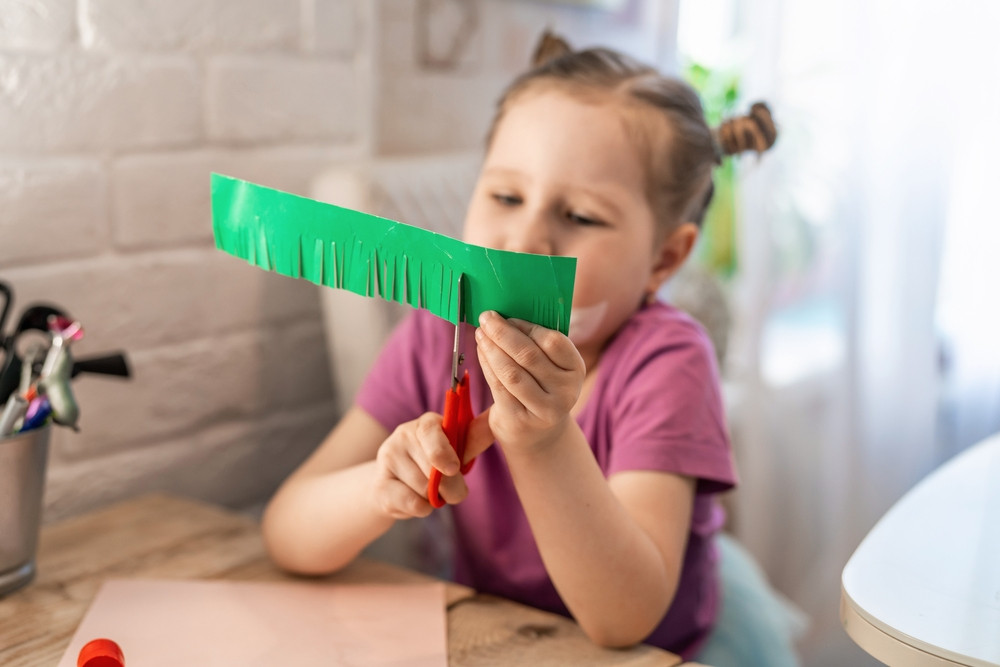Occupational Therapy
Seven Ways to Nurture Fine Motor Skills

The coordination and control of the small muscles in our hands and fingers that enable precise movements are called fine motor skills. These skills are crucial for tasks like holding a pencil, buttoning a shirt and other activities that require accuracy and dexterity.
Developing fine motor skills helps with everyday independence and builds the foundation for more complex skills, like writing and drawing.
Fine motor skills are essential for your child’s daily life, but developing these skills takes time and practice. With a few fun activities and easy tips, you can play a role in helping them build the coordination and dexterity they need to thrive. Here are some ways you can encourage your child’s fine motor development in ways that feel like play!
1. Use Art and Craft to Create and Practice
Creating art is a great way to practice the small hand movements that fine motor skills require. Simple activities like drawing, painting, and glueing help with hand-eye coordination and finger strength. Consider these activities to bring out their inner artist:
Play with Clay or Play-Doh: Rolling, squishing, and shaping clay is a great hand workout. It builds strength and allows children to get creative.
Cutting Paper: Using child-safe scissors to cut shapes or make collages is excellent for hand-eye coordination. Let them cut pictures from old magazines or make fun shapes out of coloured paper.
Finger Painting: Finger painting encourages kids to use their fingers for fine control and helps with hand strength.
2. Introduce Fun, Everyday Challenges
Sometimes, the best ways to build motor skills are with activities we do every day. Turn daily routines into fun practice for fine motor skills:
Buttoning and Zipping: Have your child practice buttoning up their own shirt or zipping up their jacket. These movements require hand strength and dexterity.
Peeling Stickers: Stickers are fantastic for building pincer grip. Let them create sticker art or reward them with stickers to encourage them to peel and place them. There are also fantastic sticker books available online.
Snack Time Sorting: Have your child sort small snacks, like sultanas, small cereals like Cheerios, or nuts (assuming no allergies in the family). It’s a fun snack activity, and picking up small pieces encourages control and precision.
3. Build with Blocks and Toys
Playing with toys like blocks and Lego helps children strengthen their hand and finger muscles and improves coordination.
Lego Building: Constructing with Legos requires a firm grip and precise placement, perfect for developing fine motor skills.
Stacking Blocks: Let your child stack and knock down blocks. This not only works on fine motor skills but also helps with spatial awareness and balance.
Puzzles: Picking up and placing puzzle pieces is great for developing the pincer grasp, a foundational fine motor skill.
4. Encourage Outdoor Play with a Purpose
Outdoor activities can be excellent for fine motor skills, especially those that involve gripping or grasping.
Sandbox Play: Let your child dig, scoop, and sift through the sand using shovels, buckets, or their hands.
Water Play: Fill a bucket with water and let them use sponges, squirt bottles, or small water toys. This is great for strengthening hands, and it’s refreshing on a hot day!
Nature Scavenger Hunts: Have them collect small treasures like leaves, acorns, and rocks, which requires picking up small items and strengthens their grasp.
5. Turn to Simple Household Chores
Including children in light chores can be a wonderful way to build fine motor skills while instilling a sense of responsibility.
Setting the Table: Ask your child to help set the table by placing utensils and napkins. This activity requires coordination and teaches a practical life skill.
Folding Clothes: Show them how to fold washers or their own clothes. This strengthens their hands and helps them practice hand-eye coordination.
Spray Bottles and Sponges: Kids love using spray bottles! Let them help with simple cleaning tasks like wiping down a table. Squeezing a spray bottle requires both grip and finger strength.
6. Make Screen Time Count
Screen time can support motor skill development if you choose interactive and educational apps.
Drawing and Tracing Apps: Many apps let kids practice drawing shapes or letters, helping with control and coordination.
Games with Swiping and Tapping: Look for games that require gentle swiping and tapping. They help children develop a controlled touch and are especially helpful for toddlers learning to control their movements.
7. Let Them Practice Self-Care Skills
Self-care skills like brushing teeth and using utensils also build fine motor skills. Resist the temptation to jump in and help your child too quickly!
Using a Fork and Spoon: Eating with utensils is great for hand coordination. Encourage them to eat by themselves, even if it’s a bit messy at first.
Brushing Teeth: Guide them to hold their toothbrush properly and brush on their own. It’s excellent practice for grip and coordination.
Opening and Closing Containers: Give them child-safe containers to practice opening and closing. It can be as simple as unscrewing a water bottle or unzipping a pouch.
Remember, every child develops at their own pace, so be patient. Not all children will be able to perform tasks at the same numerical age. Celebrate their small victories and keep the activities light, fun, and age-appropriate. By making these activities a regular part of their playtime or routines, you’ll help your child build the strength and control they need for fine motor skills—one fun moment at a time. Remember too that if you have concerns about your child’s development, seek guidance from your GP or Pediatrician.